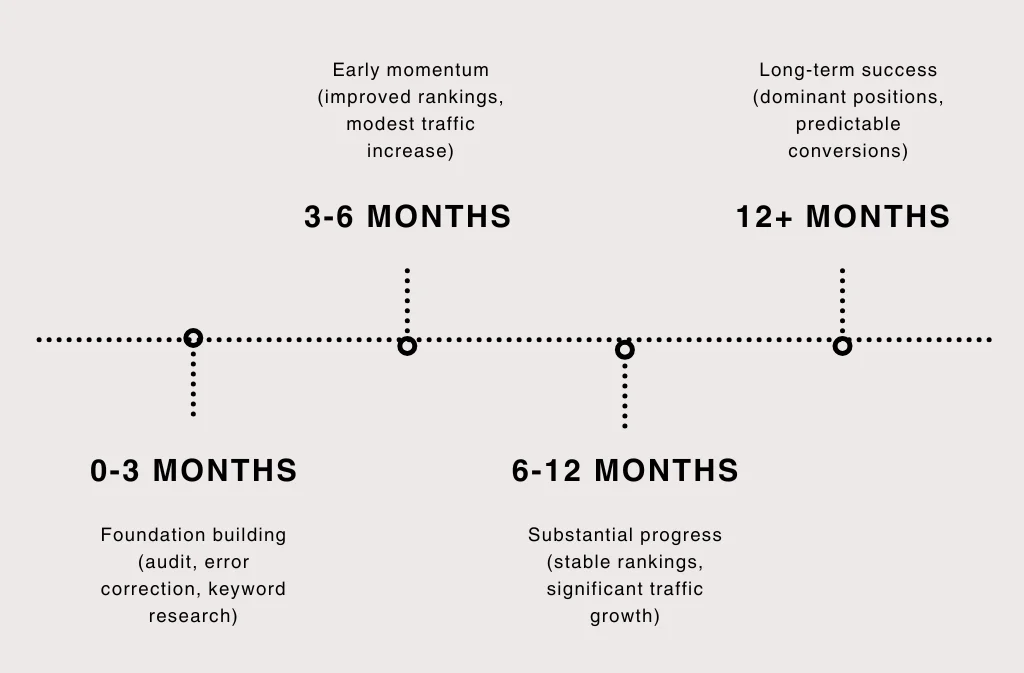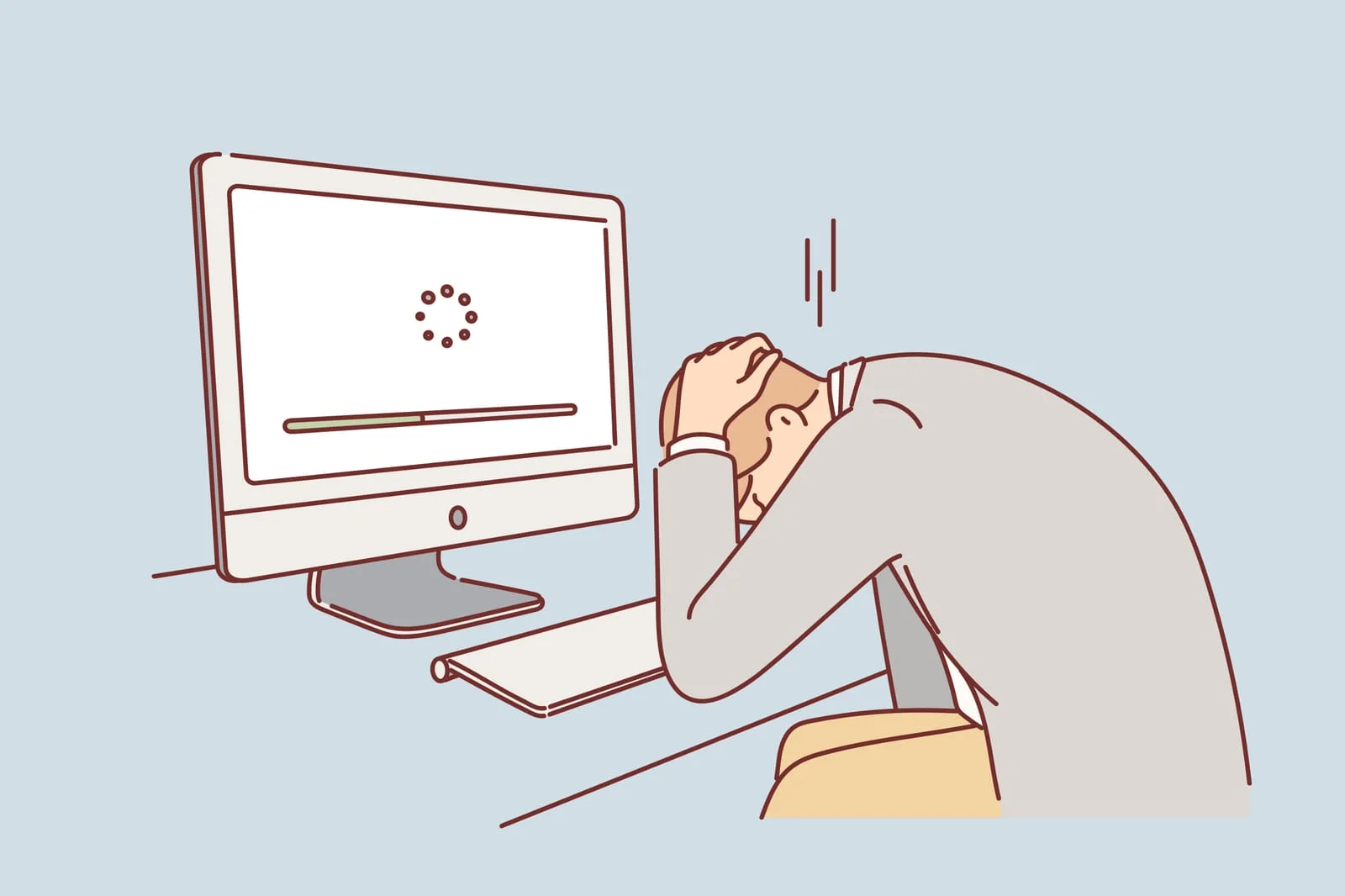Anyone who’s ever dabbled in the world of SEO knows that it can be frustrating when results don’t show up immediately. The long wait between implementing changes and seeing noticeable improvements is often one of the most common frustrations for business owners and marketers. So, if you’re asking, “How long does SEO take to work?” you’re not alone.
SEO is often treated like a magic trick that should work quickly, but the truth is that it’s a long-term investment. It’s not something that brings instant success or quick fixes, but when done right, it can pay off in spades over time. Slow progress doesn’t mean your SEO strategy is failing—it’s just a sign of gradual, sustainable growth that will benefit your business in the long run.
In this article, we’ll address why SEO takes time, outline a typical timeline, and explore why slow progress doesn’t necessarily spell failure. By the end, you’ll understand why patience and persistence are key to successful SEO.
The Reality of SEO: A Marathon, Not a Sprint
The journey to SEO success is often paved with impatience and frustration. In a world where we’ve grown accustomed to instant gratification, waiting months to see substantial results from your SEO efforts can feel discouraging. Many businesses abandon their optimization strategy prematurely, mistaking the natural progression of search optimization for failure.
“How long does SEO take to work?” This question plagues marketing meetings across industries, but the answer isn’t as straightforward as we’d like. Unlike paid advertising, which can drive traffic the moment you launch a campaign, SEO requires patience, persistence, and a long-term vision.
The truth is that slow progress in SEO doesn’t indicate failure—quite the opposite. It typically signals that you’re building a foundation for sustainable growth rather than chasing temporary ranking boosts that disappear as quickly as they arrive.
Why Immediate Results Are Rare in SEO
When comparing SEO to other marketing channels, it’s important to understand why it operates on a different timeline. Pay-per-click advertising, social media campaigns, and email marketing can all generate immediate traffic spikes. SEO, however, requires search engines to crawl, index, and evaluate your website against hundreds of ranking factors, then compare it to competing sites targeting the same keywords.
This evaluation process is complex and ongoing. Google’s algorithms are designed to reward websites that consistently demonstrate expertise, authority, and trustworthiness—qualities that simply cannot be established overnight.
That said, you may observe some initial improvements within the first few weeks of implementing SEO changes:
- Better indexing of your site’s pages
- Minor fluctuations in keyword rankings
- Improved crawlability for search engine bots
- Correction of technical errors that were previously hindering performance
These early signs of progress, while not immediately translating to significant traffic increases, indicate that search engines are acknowledging your optimization efforts.
Why Immediate Results Are Rare in SEO

While every SEO campaign is unique, understanding a general timeline can help set realistic expectations. Here’s a breakdown of what typically happens during the different stages of SEO implementation:
0-3 Months: Foundation Building
During the first quarter, most of the work focuses on technical optimizations and establishing a solid SEO foundation:
- Comprehensive site audit and error correction
- Keyword research and initial content optimization
- Implementation of basic on-page SEO elements
- Setting up analytics tracking and establishing baselines
- Creating an initial content strategy
At this stage, you might notice your pages being indexed more efficiently, but significant ranking improvements are unlikely. This is normal and doesn’t mean your SEO isn’t working—it’s simply laying the groundwork for future growth.
3-6 Months: Early Momentum
By the second quarter, you should start seeing more tangible results:
- Improved positions for less competitive keywords
- Modest increases in organic traffic
- Better crawling and indexing patterns
- Initial signs of authority building
- Content beginning to accumulate engagement signals
How long does it take for SEO to take effect? For many businesses, this 3-6 month period is when they first experience clear evidence that their strategy is working, though the results may still be modest compared to their ultimate goals.
6-12 Months: Substantial Progress
The six-month to one-year period typically delivers more substantial improvements:
- Stable rankings for target keywords, including some competitive terms
- Significant traffic growth compared to baseline
- Increased domain authority
- More consistent conversions from organic traffic
- Wider range of keywords driving traffic to the site
During this phase, the compounding effect of SEO begins to manifest. Content published months ago continues to gain traction, backlinks accumulate, and the site’s overall authority strengthens.
12+ Months: Long-term Success
After a full year of consistent SEO implementation, most businesses experience:
- Dominant positions for many target keywords
- Substantial organic traffic becoming a reliable channel
- Strong domain authority that makes ranking for new terms easier
- Predictable conversion patterns from organic visitors
- Reduced need for constant technical adjustments
At this stage, SEO becomes a significant competitive advantage, with each new optimization building upon a solid foundation of established authority.
Why SEO Takes Time: Key Factors That Influence Speed
The timeline for SEO success isn’t arbitrary—it’s influenced by specific factors that determine how quickly your site can climb the search rankings. Understanding these factors helps explain why SEO takes time to get results and why patience is essential.
Competition Level
Perhaps the most significant factor affecting your SEO timeline is the competitive landscape of your industry. Low competition niches may see results in 3-4 months, while moderate competition industries typically require 6-12 months to show significant progress.
Highly competitive sectors such as finance, insurance, and legal often need 12+ months of consistent effort before substantial rankings appear. When targeting keywords that major corporations and established websites have optimized for years, the path to page one will inevitably be longer. This doesn’t mean success is impossible—it simply requires more time and strategic effort.
Website Authority & Age
Search engines tend to trust established websites more than new ones. This concept, often called the “Google sandbox effect,” means that newer domains may face an uphill battle. New websites (less than 1 year old) typically take longer to rank for competitive terms, while domains with 2-5 years of history may see faster traction in search results.
Established sites (5+ years) often experience quicker ranking improvements when implementing new SEO strategies. This factor explains why how long before SEO takes effect varies significantly between a brand-new startup and an established business that’s implementing SEO for the first time.
Content Quality & Frequency
The caliber and consistency of your content publication directly impact your SEO timeline. High-quality, comprehensive content tends to rank faster than thin, superficial pages. Regular publishing schedules signal freshness to search engines, while content that genuinely addresses user intent outperforms keyword-stuffed alternatives that miss the mark on satisfying searcher needs.
Search engines are increasingly sophisticated at evaluating content quality, measuring factors like depth, accuracy, readability, and user engagement. Investing in exceptional content may extend your initial timeline but will significantly improve your long-term results.
Backlink Profile
Backlinks remain one of Google’s top ranking factors, but building a natural, high-quality backlink profile takes considerable time. Natural link acquisition is gradual and unpredictable, with high-authority backlinks having greater impact but being harder to earn.
Link velocity (the rate at which you gain links) should appear natural to avoid penalties that can devastate your SEO progress. Attempting to accelerate this process through artificial means often backfires, resulting in penalties that set your SEO progress back significantly. This is a key reason why SEO takes time—legitimate authority can’t be manufactured overnight.
Technical SEO Health
Your website’s technical foundation plays a crucial role in determining how quickly search engines can properly crawl, index, and rank your content. Fast-loading pages improve crawl efficiency and user experience, while mobile-friendliness is essential for ranking in both mobile and desktop searches.
Clear site architecture helps search engines understand and categorize your content, and secure sites (HTTPS) receive preference in rankings. Technical improvements often yield the quickest initial gains in SEO, but they must be complemented by strong content and backlinks to achieve sustainable ranking improvements.

Why Slow SEO Progress Doesn’t Mean Failure
When evaluating your SEO campaign, it’s essential to understand that slow progress is not only normal but often indicative of a healthy, sustainable approach. Here’s why patience pays off in the world of search optimization:
SEO Growth is Non-Linear
One of the most important things to understand about SEO is that progress rarely follows a steady, predictable pattern:
- Rankings fluctuate as search engines constantly update their algorithms
- Periods of apparent stagnation may be followed by sudden jumps in visibility
- Seasonal factors can cause temporary dips or spikes unrelated to your SEO efforts
This non-linear nature of search engine optimization progress means that measuring success requires looking at longer-term trends rather than day-to-day fluctuations. How long SEO takes to show consistent results depends largely on your ability to maintain course through these natural variations.
Short-Term Gains Can Be Misleading
In the SEO world, quick wins often come with hidden costs:
- Black-hat techniques may produce temporary ranking boosts followed by severe penalties
- Manipulative practices become increasingly ineffective as search algorithms evolve
- Quick-fix approaches rarely build the authority necessary for long-term success
Businesses that prioritize sustainable growth over flashy short-term results understand that SEO is an investment in their digital future. The patience required for white-hat SEO to work effectively is ultimately rewarded with more stable, penalty-resistant rankings.
Sustainable SEO Builds Authority & Trust
The time and effort you invest in SEO result in long-lasting benefits that extend far beyond short-term traffic increases. As your website earns authority through consistent, high-quality content and backlinks, ranking for new terms becomes easier. Over time, these trust signals improve your site’s credibility, boosting conversion rates as well.
Organic rankings tend to stick longer than paid ads, giving you consistent results even after your initial investment. This “SEO equity” grows steadily, and the long-term value is undeniable. By understanding how long SEO takes, businesses can appreciate the compounding benefits that come with persistent, high-quality efforts.
Why SEO Is Worth the Wait
Despite the time investment required, SEO continues to offer one of the best long-term returns of any digital marketing channel:
- Organic search drives approximately 53% of website traffic across industries
- SEO leads have a 14.6% close rate, compared to 1.7% for outbound leads
- The compounding nature of SEO means results typically improve over time
- Unlike paid advertising, traffic doesn’t immediately disappear when you stop investing
How long SEO takes to work is ultimately less important than the sustained value it delivers once established. Businesses that maintain consistent SEO efforts typically find that the long-term returns far outweigh the initial waiting period.
Conclusion: Patience Pays Off in SEO
How long does SEO take to work? The answer varies based on your industry, competition, website history, and the quality of your optimization efforts. For most businesses, noticeable improvements begin within 3-6 months, while significant results typically emerge within 6-12 months of consistent implementation.
Understanding that SEO takes time to get results isn’t just about setting realistic expectations—it’s about recognizing the value of building a sustainable foundation for long-term digital success. The gradual nature of search engine optimization progress isn’t a bug but a feature, ensuring that rankings are earned through genuine value rather than manipulation.
For businesses willing to commit to the process, the rewards of SEO extend far beyond temporary traffic spikes. A well-executed strategy creates a self-reinforcing cycle of authority, visibility, and trust that continues delivering value long after the initial investment period.
Remember that in SEO, slow and steady truly does win the race. The websites that dominate search results today aren’t necessarily those that sought the quickest path to ranking—they’re the ones that consistently delivered exceptional value to their users while methodically building their authority over time.
FAQ Section:
1. Why does SEO take so long to work?
SEO takes time because it’s a gradual process that involves improving the quality and authority of your website. It involves several factors, such as content creation, technical optimization, and backlink building, all of which take time to yield results.
2. Can I speed up my SEO results?
While you can’t rush SEO, you can speed up the process by focusing on high-quality content, building natural backlinks, and ensuring your site is technically optimized. However, avoid shortcuts like black-hat SEO tactics, as these can harm your rankings in the long run.
3. Is SEO worth the wait?
Absolutely. While SEO takes time, the long-term benefits are undeniable. SEO provides sustainable growth, increased traffic, and better conversions over time. With persistence and consistent effort, SEO will deliver significant returns on investment.







